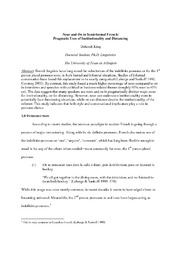
ATTENTION: The works hosted here are being migrated to a new repository that will consolidate resources, improve discoverability, and better show UTA's research impact on the global community. We will update authors as the migration progresses. Please see MavMatrix for more information.
Show simple item record
| dc.contributor.author | King, Deborah | |
| dc.date.accessioned | 2010-11-16T22:50:27Z | |
| dc.date.available | 2010-11-16T22:50:27Z | |
| dc.date.issued | 2010-11-16 | |
| dc.identifier.uri | http://hdl.handle.net/10106/5190 | |
| dc.description.abstract | French linguists have long noted the substitution of the indefinite pronoun on for the 1st person plural pronoun nous, in both formal and informal situations. Studies of informal conversation have found this replacement to be nearly categorical (Laberge and Sankoff 1980; Coveney 2000). By contrast, this study found a much higher percentage of nous compared to on in interviews and speeches with political or business-related themes (roughly 60% nous to 40% on). The data suggest that many speakers use nous and on in pragmatically distinct ways: nous for institutionality, on for distancing. However, nous can underscore institutionality even in potentially face-threatening situations, while on can distance despite the institutionality of the referent. This study indicates that both style and conversational implicature play a role in pronoun choice. | en_US |
| dc.language.iso | en_US | en_US |
| dc.publisher | Linguistics & TESOL | en_US |
| dc.subject | Pragmatics | en_US |
| dc.subject | Linguistics | en_US |
| dc.subject | Sociolinguistics | en_US |
| dc.subject | French language | en_US |
| dc.subject | Pronouns | en_US |
| dc.subject | Corpus linguistics | en_US |
| dc.title | Nous and On in Semi-formal French: Pragmatic Uses of Institutionality and Distancing | en_US |
| dc.type | Working Paper | en_US |
Files in this item
- Name:
- On_Nous_in_French-1-20.pdf
- Size:
- 221.6Kb
- Format:
- PDF
This item appears in the following Collection(s)
Show simple item record


